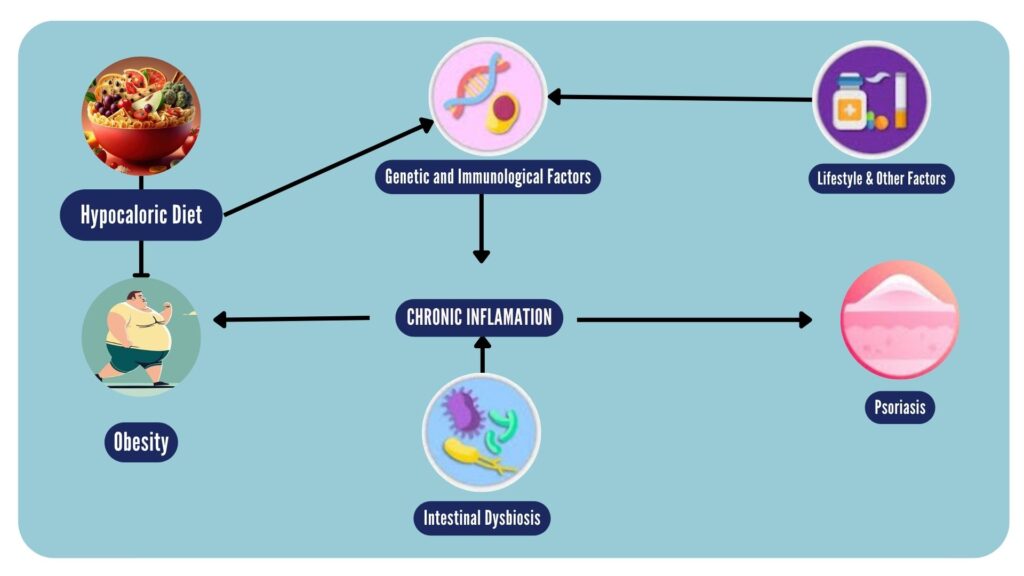
Shruti
Bariatric Dietician & Content Writer
Is There a Link Between Psoriasis and Obesity?

Obesity is a major public health issue worldwide since it is associated with the development of chronic comorbidities such as type 2 diabetes, dyslipidemias, atherosclerosis, some cancer forms and skin diseases, including psoriasis.
Scientific evidence has indicated that the possible link between obesity and psoriasis may be multifactorial, highlighting dietary habits, lifestyle, certain genetic factors and the microbiome as leading factors in the progress of both pathologies because they are associated with a chronic proinflammatory state.
Psoriasis is a chronic autoimmune disease that affects the skin. It causes patches of thick, red, and scaly skin to form, often covered with silvery-white scales. These patches, or lesions, can appear anywhere on the body but are most commonly found on the knees, elbows, scalp, legs and lower back. There are many trigger factors for psoriasis.Obesity defined as Body mass index over 30. Obesity is a risk factor for psoriasis, and psoriasis can cause weight gain.
Studies on the relationship between psoriasis and obesity In a study with 35,000 participants, the results of the metabolic syndrome and the risk of developing psoriasis were found.
The Underlying Mechanism
There are several theories that researchers have proposed. One theory suggests that excess fat tissue releases inflammatory molecules called cytokines, which can contribute to the development and worsening of psoriasis. Additionally, obesity is known to cause a state of chronic low-grade inflammation, which can further exacerbate the condition.
Fat Tissue and Psoriasis
To communicate with each other your cells and tissues release signaling molecules called cytokines. Cytokines are similar to hormones but they are usually smaller than hormones, cytokines go into your bloodstream where they can quickly reach all parts of your body
Excess fat tissue may produce inflammatory substances called adipokines that contribute to the development and severity of psoriasis. These substances can also affect the immune system, which plays a role in the development of psoriasis.
Obesity has been suggested as one of the mainstay factors of chronic inflammatory processes associated with psoriasis. Furthermore, it has been described how adipokines and pro-inflammatory cytokines contribute to psoriasis development from the sick adipose tissue
Role of the Microbiome
Another important role between obesity and psoriasis is microbiome. Obesity may alter the composition of the gut microbiome, leading to an increase in inflammatory substances that contribute to the development and severity of psoriasis. One potential mechanism is that obesity may lead to an increase in intestinal permeability, allowing bacteria and their products to enter the bloodstream and trigger inflammation. This inflammation may contribute to the development of psoriasis.
Bariatric Surgery as a Treatment
Bariatric surgery, also known as weight-loss surgery, is a surgical procedure that helps people with obesity lose weight by reducing the size of their stomach or bypassing a portion of the digestive tract. While weight loss itself can improve various health conditions associated with obesity, including diabetes and heart disease, studies have also highlighted its positive impact on psoriasis.
Research has shown that bariatric surgery not only leads to significant weight loss but also improves the severity and symptoms of psoriasis. A study published found that patients who underwent bariatric surgery experienced a significant reduction in psoriasis severity compared to those who did not undergo the procedure.
Potential Explanations for the Benefits
The improvements in psoriasis following bariatric surgery can be attributed to multiple factors. First, the weight loss achieved through bariatric surgery can reduce the levels of inflammatory markers in the body, which in turn can alleviate the inflammation associated with psoriasis. Additionally, bariatric surgery can improve insulin sensitivity and metabolic parameters, leading to a positive impact on both obesity and psoriasis.
Aastha Bariatrics is the center of excellence. Center of Excellence in Bariatric & Metabolic Surgery certification is awarded to a facility and its associated surgeons who have successfully completed the designation process of delivering high quality pre-operative and long term follow-up care.





